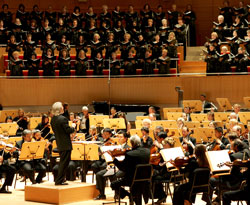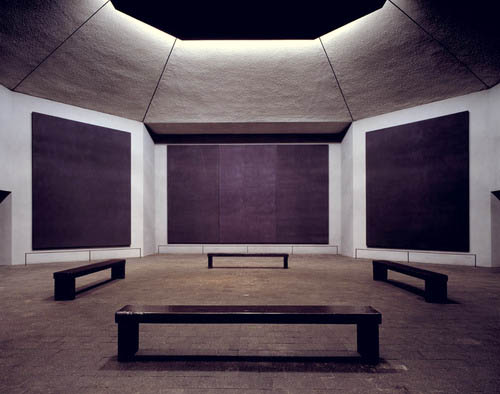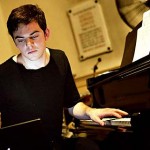
One of the most exciting areas for new music in recent years has been in the field of choral music. In the next two weeks, two choirs devoted to new music—one a veteran organization, the other an exciting, young rookie—will be presenting important programs of new choral works in both coasts.
The rookie is Baltimore’s Anima Nova Chamber Choir, which will present a concert of works by Eric Whitacre, Tarik O’Regan, Michael Rickelston, Sean Doyle, and Anima Nova founder and director, Jake Runestad. The concert, at 7:30 p.m. on Sunday, May 8 at St. Ignatius Church, 740 North Calvert Street in Baltimore, will benefit the Peabody Preparatory’s “Jr. Bach” scholarship, which provides opportunities for underprivileged students to attend the Peabody Prep.
The veteran ensemble is San Francisco’s Volti, which for the past 32 years has been at the vanguard of new choral music in the United States under the direction of its founder, Robert Geary. Their season finale will be presented three times (Friday, May 13 at 8:00 p.m. at the Berkley City Club; Saturday, May 14 at 8:00 p.m. at First Lutheran Church in Palo Alto; and Sunday, May 15 at 4:00 p.m. at the Walt Disney Family Museum in San Francisco’s Presidio) and features works commissioned by Volti, two of which, Matthew Barnson’s Genesis and Elliot Gyger’s voice (and nothing more), are world premieres.
Barnson composed his Genesis, a re-interpretation of the biblical story of creation through poetry, at Volti’s Choral Arts Laboratory, its annual commissioning and residency program where composers under 35 work with Volti’s singers, Artistic Director Robert Geary and Composer in Residence Mark Winges to create a new work for choir in a workshop setting, culminating in its premiere at the end of a given season. Barnson describes Genesis as “three tableaux that are independent of one another but dependent upon the Book of Genesis to give them meaning. Each is a subversive exegesis upon the original story of creation and posits a slight, but vital alternative in the narrative, affecting the outcome of the myth in ways that are sometimes insignificant (but poignant) and sometimes darkly different. Each of the poets whose work I set refracted my original intentions. For instance, the outer movements of the triptych actually retell stories from the book of Genesis. In the second, middle movement I set Richard Siken, a poet whose ecstatic and anxious book, Crush is replete with Biblical images. Beyond the images of apples (knowledge but death) is the feature that the last two poems share: death deferred.”
Elliot Gyger’s voice (and nothing more) reflects the composer’s interest in “language and communication in their own right.” The original germ for what would become voice (and nothing more) was planted ten years ago, when Gyger was a graduate student at Harvard University, where he heard a lecture by musicologist Mauro Calcagno. “Occasionally as a composer,” one encounters by chance a piece of text (or other extra-musical stimulus) for which one may have no immediate use, but which makes such a strong impact that one files it away for future reference. Among the many fascinating sources which Calcagno discussed was a passionate diatribe on the transience of the voice from Emanuele Tesauro’s La metafisica del niente (The Metaphysics of Nothing). (more…)




 Arvo Pärt: Symphony No. 4
Arvo Pärt: Symphony No. 4 Estonian composer Arvo Pärt turned 75 yesterday. His record label ECM Records is celebrating his three-quarters of a century with two new recordings.
Estonian composer Arvo Pärt turned 75 yesterday. His record label ECM Records is celebrating his three-quarters of a century with two new recordings.

